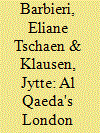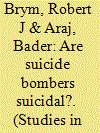| Srl | Item |
| 1 |
ID:
113531


|
|
|
|
|
| Publication |
2012.
|
| Summary/Abstract |
This article seeks to shed light on the ongoing debate about the extent of Al Qaeda's involvement in homegrown jihadist conspiracies in the West. Focusing on the London-based jihadist movement in the 1998-2008 decade, the article uses network analysis to test the domestic and transnational integration of Western networks. The evidence stems from an extensive database of individuals involved in jihadist terrorist conspiracies in the West compiled by the authors. Results show that Al Qaeda developed a branch organization in the United Kingdom during that period. A sociogram of U.S.-based networks is indicative of a dispersed topography, and a comparison shows the British model may not be representative of Western networks overall.
|
|
|
|
|
|
|
|
|
|
|
|
|
|
|
|
| 2 |
ID:
113532


|
|
|
|
|
| Publication |
2012.
|
| Summary/Abstract |
Recent work by Ariel Merari argues that, while certain contextual factors increase the probability of suicide attacks, they do not explain why particular individuals become suicide bombers. Merari seeks to demonstrate that suicide bombers are motivated by an unusually high prevalence of depression and suicidal tendencies. This article questions the representativeness of Merari's sample. It raises the possibility that interviewer and contextual effects contaminated his findings. Finally, it presents evidence that challenges Merari's conclusions. This evidence is drawn from interviews with immediate family members and close friends of a 25 percent random sample of Palestinian suicide bombers who conducted attacks between 2000 and 2005. Based on their analysis, the authors question the value of a psychological approach to the study of suicide bombers and assert the importance of focusing on the political and social roots of the phenomenon.
|
|
|
|
|
|
|
|
|
|
|
|
|
|
|
|
| 3 |
ID:
113534


|
|
|
| 4 |
ID:
113533


|
|
|
|
|
| Publication |
2012.
|
| Summary/Abstract |
In this issue of Studies in Conflict & Terrorism Brym and Araj published a critique of the study of would-be suicide bombers that the present author carried out with colleagues. Brym and Araj's point of departure was their allegation that the article attributed the Palestinian suicide attacks mainly to depression and suicidality of the suicide bombers. Their critique was aimed at disputing this alleged attribution. For this end they criticized various aspects of the methodology used in the study and described their own study which, in their view, challenges the author's findings. In this response article the author shows that Brym and Araj's critique is based on false allegations, cannibalized quotes, and distorted interpretation of the published descriptions of the study. Their methodological criticism alleging biased psychological assessment is invalid because it ignores the use of a control group and a "blind" reliability check of the diagnoses. Brym and Araj's own study suffers from serious methodological problems: venturing a psychological assessment on the basis of a brief interview with family members, conducted and analyzed by persons unqualified for making clinical psychological diagnoses, without using a standard battery of psychological tests. Brym and Araj did not use a control group and a "blind" reliability check of their diagnoses.
|
|
|
|
|
|
|
|
|
|
|
|
|
|
|
|